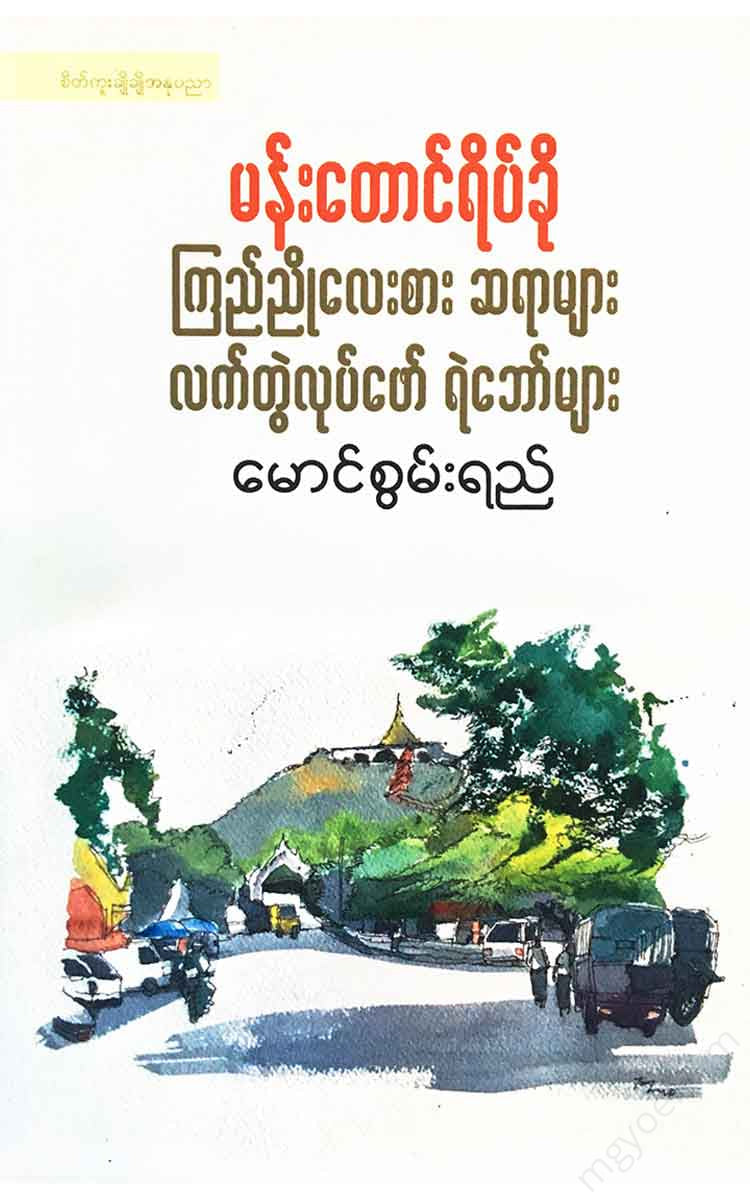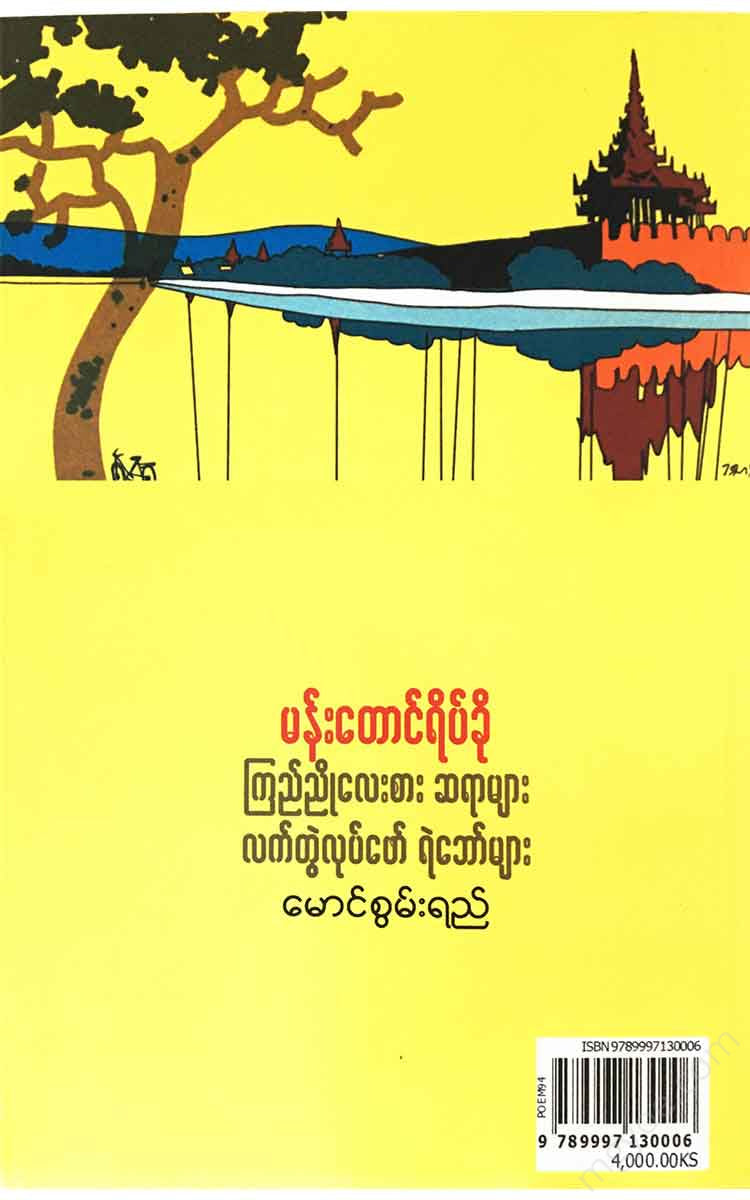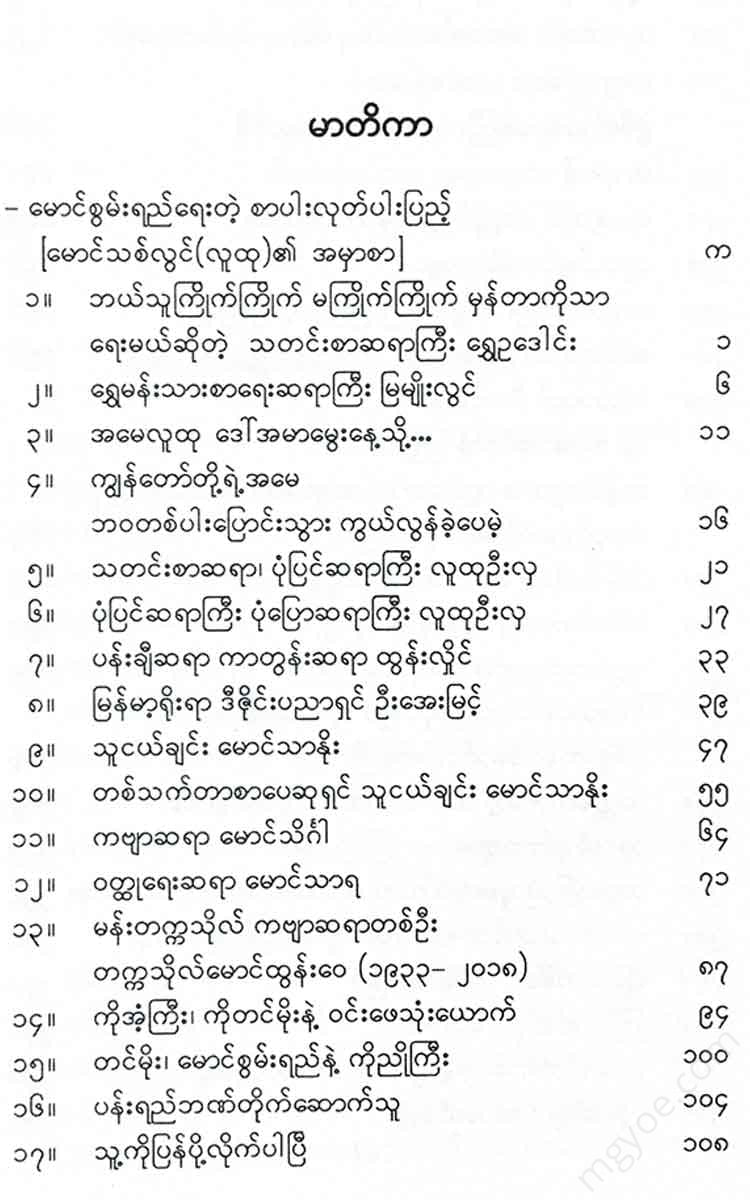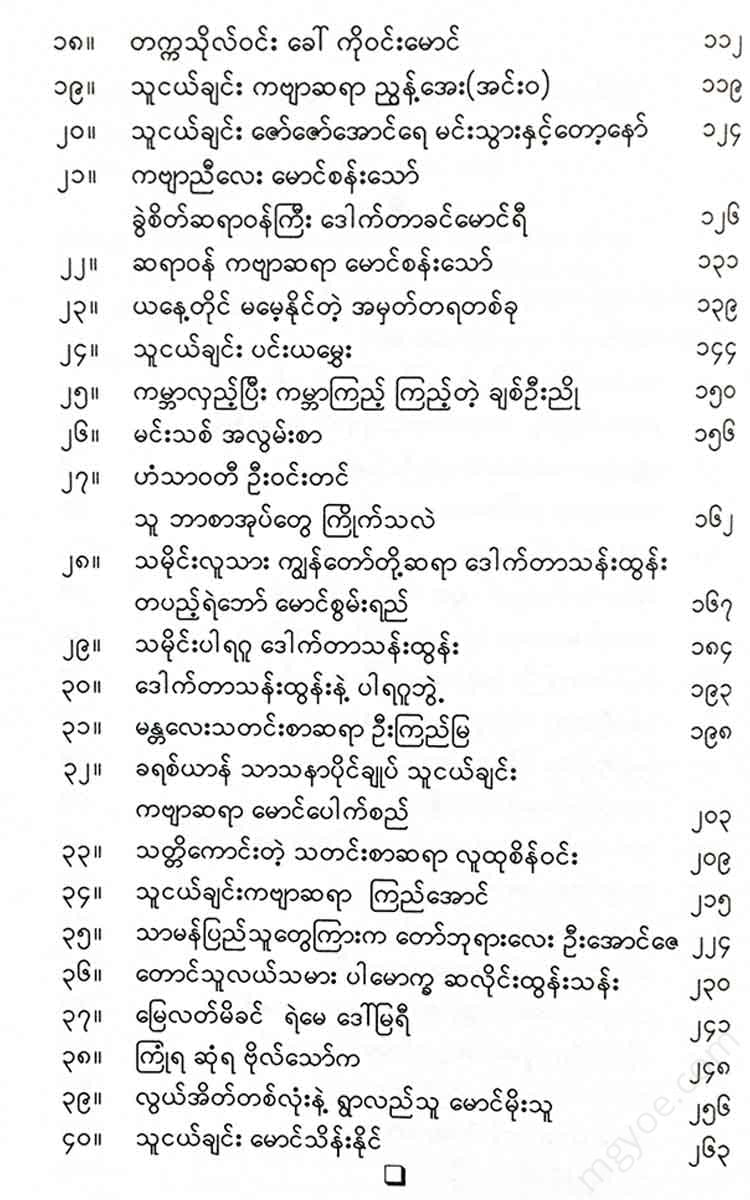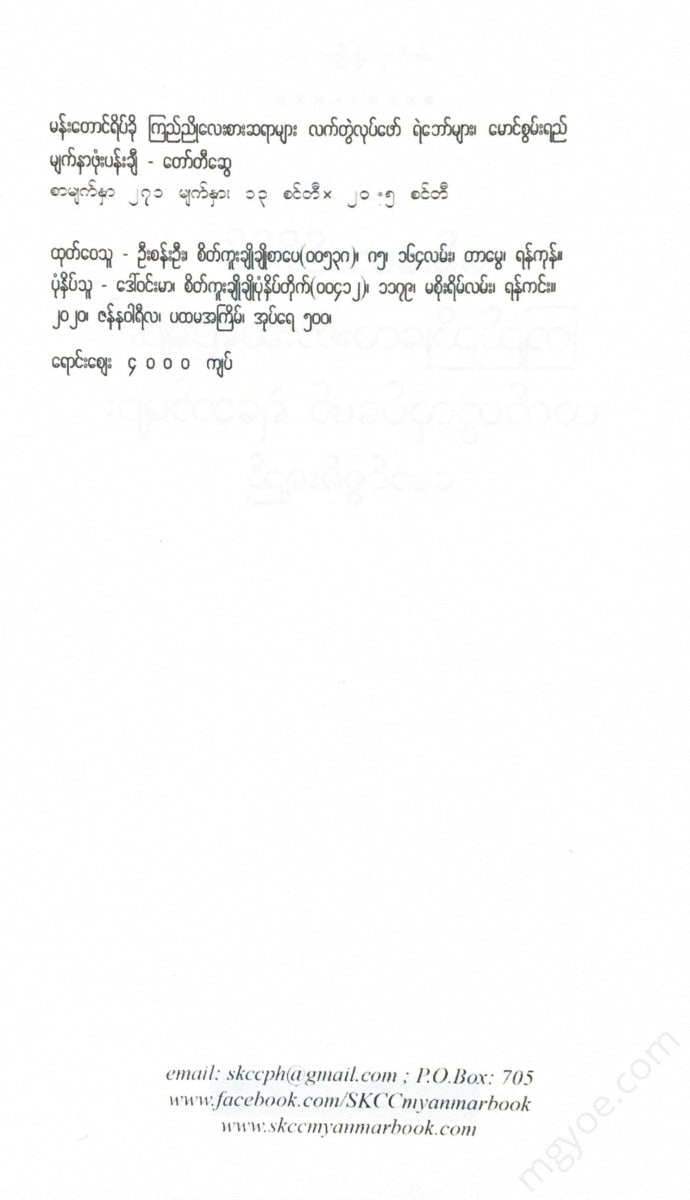စိတ်ကူးချိုချိုစာပေ
Maung Taung - Mantaung Yeik Kho (respected teachers, colleagues and comrades)
Maung Taung - Mantaung Yeik Kho (respected teachers, colleagues and comrades)
Couldn't load pickup availability
Hello . May 3 is World Press Day. So I want to continue talking about newspapers. This week I will talk about Shwe U Daung, one of the fathers of the Burmese press. He was the editor of Thuriya Newspaper since its inception, along with other great journalists such as Thakin Htin Taw Hmoing, Pi Moe Ning, and U Tun Pe.
A journalist is not someone who writes news and headlines like writers, and their name is not known. Everyone knows that the great teacher is so good at translating that it can be said that he is “unique.” But I think only journalists and writers know for sure that he is unique in the field of newspaper headlines. In the past, the newspaper era paid special attention to the "headline". Shwe U Daung wrote headlines since he was in Thuriya and continued to write in the public newspaper, which was particularly prominent. In the world of newspapers, Shwe U Daung wrote headlines for the public newspaper and U Law Yoon wrote headlines for the English-language Nation newspaper. The readers of these two newspapers were respected and followed. This is a distinctive feature of the democratic era. During the authoritarian era, journalists did not accept criticism and guidance. In the matter of headlines, they were respected for both writing and content. Since they had to guide both the government and the people, not many people could write them. The teacher's writing was so powerful that it could be called "down-down". The sentences should be as smooth and beautiful as a gin coming out of the press. The teacher also advised that the sentence structure should not be too soft and weak. The good prose of Saya Zaw Gyi and Saya Min Thuwan is due to the good planning and connection system of the university teachers. Master Shwe U Daung is unique in his choice of words and sentences and in his use of local, regional idioms. His daughter and disciple, Luthu Daw Amar, said that Master Shwe U Daung writes prose in spoken form. He does not write like a letter. In the Burmese literary world, it has been commented that Master Shwe U Daung is the only one who writes prose in spoken form after Master Thakin Htaung.
It is also necessary to have a variety of topics in the headlines. Some are literary. Some are religious. The teacher has written a variety of topics for more than 20 years of writing headlines and more than 50 years of writing. When writing economic articles, he also studied Karl Marx's economic views. If you don't know Marxism at that time, you are not up to date. The teacher accepted and appreciated Marx's analysis of the capitalist economic system. However, "I like the leftist ideology in the country's economic system, but I also point out the mistakes of the leftists. If I point out such things, I don't care if it hinders the success of the leftist ideology. I believe that if the leftist ideology succeeds in the country, the majority can be free, but if the big leftist leaders think they are wrong, I don't want to cover it up." He used to write, "I only want to admit that I am right, whether I like it or not." For this reason, even during the democratic era of the Federalist Party, the teacher was arrested and imprisoned. During the Masala era, not only was his article rejected by the newspaper where he was the editor-in-chief, but he was also fired. It was General Ne Win who did it.
When Master Shwe U Daung wrote, “I want to admit that I write what is right, whether I like it or not,” the public said that she thought, “Master is very intelligent.” “But if U Lay Thein is still alive today, the voices of democracy are already resounding among all leftists, both in the countries that are called true leftists and in the countries that are called fake leftists, U Lay Thein. It is true that U Lay Thein’s head is needed,” I wonder how proud and happy U Lay Thein would be.
I remember. This is a public opinion piece on the democratic views of Shwe U Daung. As a teacher, I only had to criticize the fake leftist military dictatorship in the newspaper once. It was immediately dismissed.
In December 2002, I went to read a paper on the history of Burmese literature at Leiden University in Amsterdam, the Netherlands. I added that a journalist and writer named Luthu Daw Amar had commented that Master Shwe U Daung’s U San Sya detective novels were better than the original Shalom Home. Shalom Home novels were translated throughout Southeast Asia almost simultaneously with Myanmar. These literary scholars are particularly interested in the experience of Burma. I still ask about this in writing to this day.
I would like to highlight the exceptional quality of the prose writing of the teacher and the way in which he incorporated patriotic politics into his Burmese writing that was not in the original. For example, U San Sha did not accept the case of the Tow Pon Gyi San Phay.
“Sanphey only harasses the government, not the people. So we can’t arrest him. When the police broke their promise to shoot Sanphey because they wanted a reward, U Sansyar stepped in front. You can shoot me too. The teacher wrote these things before others did. Not only that. When the British major came to him, he said, “U Sansyar, you used to only accept cases of ordinary ethnic groups. Today, you have been promoted because you have been assigned a case like me.”
I said.
"The major is wrong. Just yesterday I accepted the case of a Shan chieftain. A chieftain is a king, so he is higher in rank than the major."
He replied. This is how Shwe U Daung Burmese religion responded. I understand that just as Master Thakin Htin Taw Hmoing supported Saya San Thu Pon, Master Shwe U Daung supported and honored Tow Pong Gyi San Phey. I am proud.
When Shwe U Daung became the editor-in-chief of the Mandalay Public Newspaper, he was far from Thakin Htin Daw Hmoing. However, when the civil war broke out, he preached Thakin Htin Daw Hmoing’s “peace without any one’s consent” and personally participated in the peace process. In the past, successive governments also said that the rebels should surrender unconditionally and that they would not accept political speeches. Hmoing and Daung’s two disciples listened to the government. They did not listen because they did not really want peace. We must know this history. Today’s youth should inherit the democratic journalism of Thakin Htin Daw Hmoing and Shwe U Daung and use Shwe Daung’s pen to urge them not to lose sight of democracy and peace.
Shwe Mann, the great writer
Mya Myo Lwin
In Mandalay, the Upper Burma Writers' Association held a reading and singing event for senior writers every Writers' Day. It was a tradition that was celebrated with great enthusiasm in the 1960s and 70s. It is a sad record that it stopped when the military government ordered that no organizations or gatherings be held.
Among the great scholars who have been criticized for their writings are Kyaw Sawan U Mya, Sagaing U Bo Thin, Master Shwe U Daung, Master Mya Myo Lwin, and others. The papers I read are full of literature, poetry, history, etc. These are the papers that are often cited in the writings of masters and doctoral theses in universities today. The papers are purely about literature and do not contain any contemporary issues, so they cannot contain anything that could harm the military regime. There is no need to miss the literature of soldiers, so I do not miss them or praise them, but I do not want to be a part of them.
I am writing this article because I remember a paper I wrote earlier. The paper is about the “Baeyang Tan Novel Era”. (I don’t have any books or documents to refer to, so I apologize for not being able to give you the exact details.) The author of the Baeyang Tan novel was Maung Taung. This article is not about Maung Taung. I will write about a famous novelist who was especially famous in the late colonial period. His name is Mya Myo Lwin. Mya Myo Lwin said, “He was known as the king of the Baeyang Tan novel era. Among those who wrote Baeyang Tan at the same time as him, there was the famous film director Thukha. Dagon Sway, who often translated adventure novels, was also among them. Mya Myo Lwin is at the top.
Mya Myo Lwin is from Mandalay. His appearance is a true example of a noble man. He is dark-skinned, tall, and thin. He speaks in a low, husky voice. But he is very good at speaking and speaks in a manly manner and in a manly tone. He is also famous because his characters speak in a manly manner and in a manly tone. That is why he is popular and the readers have awarded him the title of the king of the Baekye Tan novel era. Oh.. the sentences are about a page long. But neither the writer nor the reader is dazzled.
We also request the great people we are about to meet to “give us advice.” Surprisingly, Shwe U Daung, a great writer from Mandalay, was among the worst writers. He spoke in a low voice, which was so annoying that even the audience listened to him.
The second person who is known to be a poor speaker is Sayadaw U Thaw Bita, who used the pen name Shwe Kaing Thar. U Thaw Bita, who did not have the courage to speak in front of the audience, joined the Stone Department without becoming a teacher. Shwe Mann Thu Luthu Daw A Ma, M.A. Daw Ohn, and Daw Ma La are also known to be poor speakers. Among them, the one who is known to be a good speaker is the “lower-class writer” Kyi Pyi Ye U Hla, also known as our U Lay Hla. (The one who was disappointed by my uncle for speaking poorly is Maung Kaew.) Master Mya Myo Lwin speaks well, but his voice is not impressive. "A small voice, a small voice" he said with a sigh. Among the young writers, Maung Taung was the closest to Master Mya Myo Lwin. Maung Tha No, Maung Moe Thu, and Tin Moe all went to Yangon. Kyi Aung had been a fugitive for 10 years. He had never attended the readings. What made me and Master Mya Myo Lwin especially close was that during the 10 years of Mandalay readings, I was the only one in our group who dared not go to the lower country (because I didn't dare to kiss Kyauk Phyu). So, Uncle Luthu U Hla (President of the Upper Burma Writers' Association) assigned Maung Taung the task of writing a paper on the period of the Baekye Tan novel. So Maung Taung had to meet Master Mya Myo Lwin for several days and discuss it. The paper was already in print, so if I re-read it, it would be a waste of time and pages. What I want to re-read now is about some of the things that the Master said that are worth remembering. The Master said, "Let us learn a lesson."
Master Mya Myo Lwin said, “When you write, brothers, don’t write about things you don’t know for sure, saying you’re writing a novel. What you know for sure is
